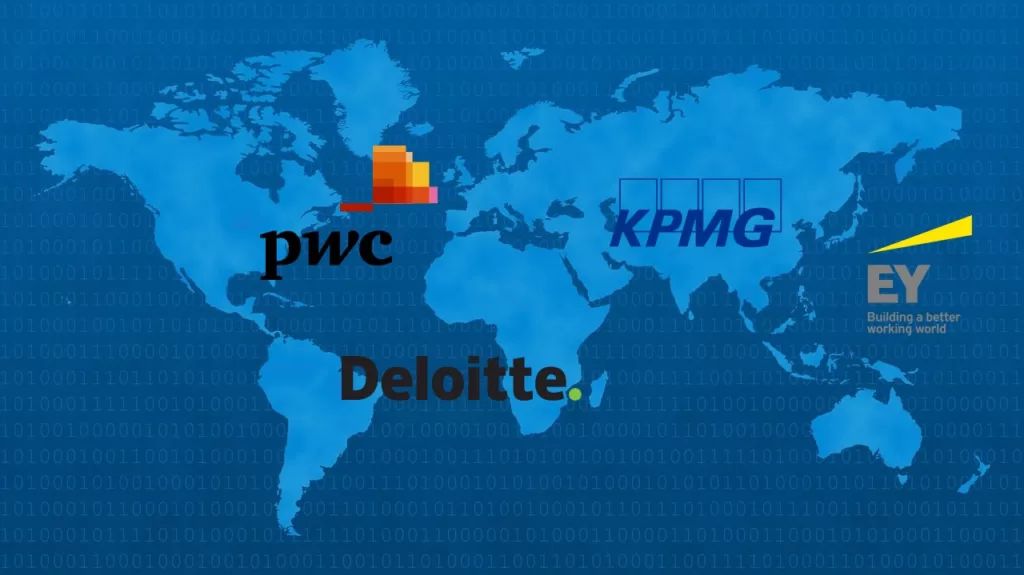The Big Four's behaviour is a global issue of concern. They cannot be relied upon to regulate themselves, so the only way to solve it is to break them apart.
 The PWC scandal demonstrates that the Big Four cannot be relied upon to regulate themselves. Nor can legislation. : 360info CCBY4.0
The PWC scandal demonstrates that the Big Four cannot be relied upon to regulate themselves. Nor can legislation. : 360info CCBY4.0
The Big Four’s behaviour is a global issue of concern. They cannot be relied upon to regulate themselves, so the only way to solve it is to break them apart.
The Australian government has so far failed to deliver on legislation that would bring the most significant breakthrough to date into forcing stronger tax and transparency regulations on multinational corporations.
Reports suggest that these global giants, along with their professional enablers lobbied against the proposed new laws.
This is at a time when the Pricewaterhouse Coopers Australia scandal has dominated headlines and repeated criticism of partnerships by the government and various senate inquiries.
The head of big four consulting firm Ernst & Young has criticised rival PwC over the firm’s tax leaks scandal, saying the alarming and disappointing conduct has rightly triggered intense scrutiny of the whole sector.
The PwC scandal, along with multiple international inquiries, reveals that the only solution to resolve conflicts of interest between auditors, accountants and consultants is to break up the Big Four and other businesses performing audits.
The role of other major non-audit-based consultants, such as McKinsey, the Boston Consulting Group, Bain and Accenture, also requires a total overhaul of how they work for and with the government is needed.
The major global audit market has essentially halved since the mid-1980s, when there were eight large international audit firms, through consolidation.
In the wake of the Enron scandal, its auditor, the firm Arthur Andersen, was charged with shredding documents relevant to the investigations into the energy company. The revelation decimated the company’s books and it was wound up in 2002.
Since then the market has reduced to four global majors. Deloitte, PwC, Ernst & Young (EY) and KPMG. Between them, these firms have almost complete ownership of the market for audits of major companies worldwide.
They audit companies that account for about 95 per cent of the Australian share market, 97 per cent of the London market’s FTSE index, and over 99 per cent of the companies in the US market’s S&P 500 share index.
In the recent Senate inquiry, Allan provided evidence that audit plays a critical role in the economy and should not be unnecessarily compromised. The fact that the Big Four provide consultancy, advisory and other services threaten to compromise the performance of audits] and it should be prohibited by legislation.
Other ways of dealing with the conflict appear not to work.
The PWC scandal demonstrates that the Big Four cannot be relied upon to regulate themselves. Nor can legislation. It has loopholes and is challenging to apply and enforce even when regulators try (which does not seem to happen now).
There is an actual and perceived conflict of interest when a firm conducting audits also seeks to do consulting work, whether for it or others.
In the previous inquiry into the audit firms in 2019, James stated that conflicts of interest seem to be inherent in providing independent auditing services and being paid for these services year in and year out by the firm being audited.
It is best not to overlay these conflicts with another set of potential conflicts, which heighten the possibilities that auditors will not provide timely independent audits.
His submission indicated significant complications, pitfalls, costs and inconveniences in all compromise measures that are sometimes proposed as an alternative, such as internal separation of the functions within one firm.
The conflicts can never be entirely resolved and where they go closer to being eliminated (or looking as if they are nearly eliminated), the rules and arrangements are costly to operate, with considerable external oversight required to ensure compliance. A clean, clear, sensible solution is preferable.
The early July spinoff of PwC’s government services to private equity buyers for $1 leaves doubts about the effectiveness of the consultancy’s purge and how the industry could be reshaped.
During the 2023 Finance and Public Administration References Committee inquiry into the management and assurance of integrity by consulting services, James highlighted that the work of consulting organisations was often rife with conflicts of interest.
Examples include advising leading fossil fuel polluters as the government mandated to reduce national emissions, auditing a sizeable prime contractor while bidding for similar contracts and writing federal tax legislation while advising clients how to minimise tax obligations.
Senators Deborah O’Neill and David Pocock have been the critical inquisitors during the Senate investigations of PwC, which resulted in a report late last month titled “PwC: A calculated breach of trust”.
The introduction of the report claims that ” the scale of significance and substantial public interest in the matter of PricewaterhouseCoopers’ (PwC) conduct about Australia’s anti-avoidance tax laws, dating back to 2013. Subsequent reports will deal with the broader range of matters arising from the inquiry’s activities which extend to the more significant consulting industry”.
The dominant role in accounting and auditing practices of transnational corporations played by the Big Four is a global issue of concern, not just a national problem.
Currently, the Parliamentary Joint Committee on Corporations and Financial Services is inquiring into ASIC’s capacity and capability to respond to reports of alleged misconduct.
A growing body of international research has documented how transnationals and their legal and accounting advisors engineer the law and regulatory structures to their advantage.
Elected officials routinely support legislation that advantages the interests of business and industry over that of the public.
Business and industrial elites gain and maintain their influence over political and bureaucratic elites through lobbying, political donations and revolving door appointments between government and industry.
As a matter of priority, the various parliamentary enquires now underway should investigate conflicts of interest and dubious ethical practices by the Big Four and those legal firms that provide aggressive taxation advice.
These entities enable companies to refashion themselves as transnational and avoid paying taxes on revenue earned in national jurisdictions.
Such enquiries should review the social licence and the social contract of the individuals and entities that provide such aggressive taxation advice. It would then act to withdraw such licences and contracts from those individuals and entities engaged in unethical and tax avoidance practices.
On 22 June 2023, the Parliamentary Joint Committee on Corporations and Financial Services resolved to commence an inquiry into recent allegations of and responses to misconduct in the Australian operations of the significant accounting, audit, and consultancy firms (including but not exclusive to the ‘Big Four’), Ethics and Professional Accountability: Structural Challenges in the Audit, Assurance and Consultancy Industry.
Our principal recommendation is that the Big Four accounting partnerships in Australia use a structural split in the audit and consulting parts of the firm.
Instead of an operational split, a “structural split” is needed. Under this, audit firms would do audit only, and neither the firms nor their associates would be permitted to sell any consultancy to audit clients.
If the Australian Parliament legislates for a structural split of the Big Four it would go some way to solve the problems handing the ability to rebuild its institutions back to the Australian public sector.
Allan Herbert Miller Fels AO is an Australian economist, lawyer and public servant. He was most widely known in his role as chairman of the Australian Competition & Consumer Commission (ACCC) from its inception in 1995 until 30 June 2003. Upon his retirement from the ACCC, he became the foundation dean of the Australia and New Zealand School of Government (ANZSOG) until January 2013. He was made an Officer of the Order of Australia in June 2001. Fels was awarded a Doctor of Laws (honoris causa) by the University of Melbourne in February 2022 and a Doctor of Laws (honoris causa) by Monash University in December 2021.
James Guthrie AM is an Emeritus Professor in the Accounting and Corporate Governance Department at Macquarie University. He has held positions at various Australian and Italian universities in a career in accounting education that spans more than 40 years. He is the joint editor of the highly regarded interdisciplinary accounting journal, Accounting, Auditing and Accountability.
Originally published under Creative Commons by 360info™.














